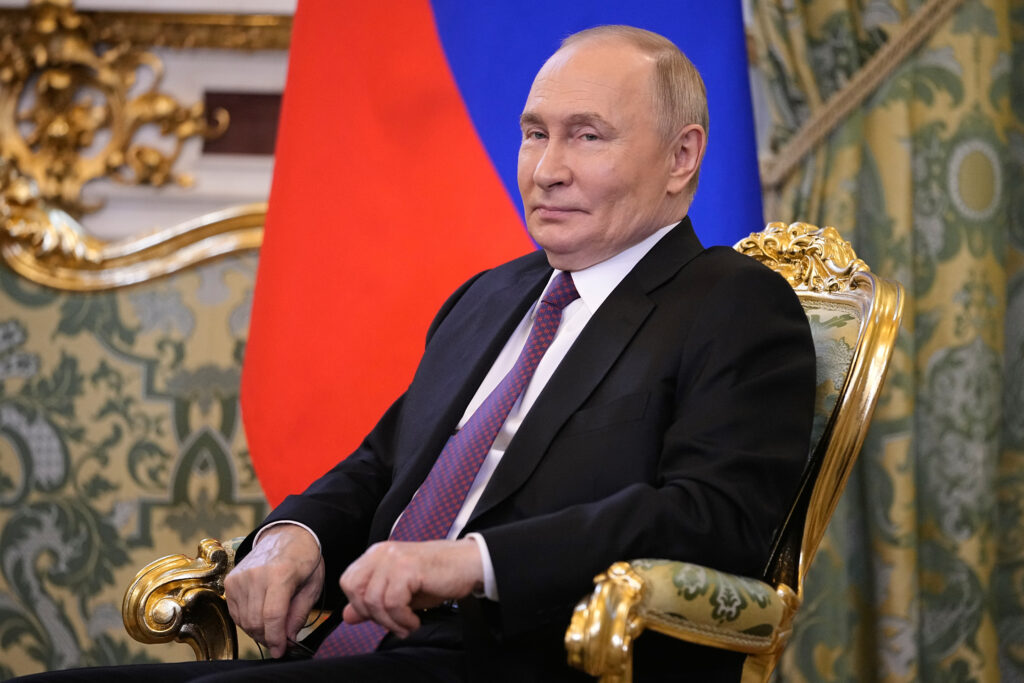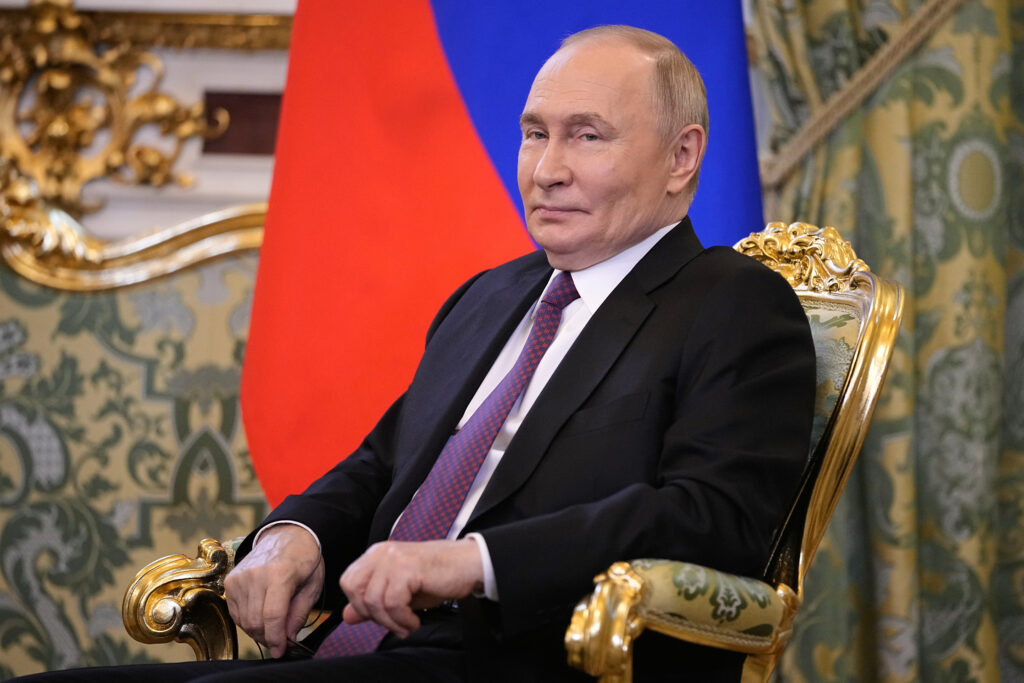Thousands of Palestinians loot UN warehouse in central Gaza: AFP journalist
Thousands of Palestinians looted a UN warehouse in Gaza’s Deir el-Balah on Wednesday, AFP footage showed and the UN’s World Food Programme said two people may have died when its warehouse there was broken into.AFP film showed crowds of Palestinians breaking into a World Food Programme (WFP) warehouse and taking bags and cartons of food supplies as gunshots rang out.”Hordes of hungry people broke into WFP’s Al-Ghafari warehouse in Deir Al-Balah, Central Gaza, in search of food supplies that were pre-positioned for distribution,” WFP said in a statement on X.”Initial reports indicate two people died and several were injured in the tragic incident,” it said, adding: “WFP is still confirming details.”The issue of aid has come sharply into focus amid a hunger crisis after Israel imposed a full blockade on Gaza for over two months, before allowing supplies in at a trickle last week.”Humanitarian needs have spiralled out of control after 80 days of complete blockade of all food assistance and other aid into Gaza,” the WFP statement said.Intense criticism has been levelled at the the Gaza Humanitarian Foundation (GHF), a US-backed group that has bypassed the longstanding UN-led system in the territory.The UN on Wednesday condemned the US-backed aid system in Gaza after 47 people were injured during a chaotic food distribution the day before when thousands of Palestinians desperate for food rushed into a GHF aid distribution site.A Palestinian medical source said at least one had died.The Israeli military on Wednesday said soldiers did not fire at civilians.”WFP urgently calls for safe, unimpeded humanitarian access to enable orderly food distributions across Gaza immediately,” its statement said. Israel stepped up its military offensive in Gaza, ignited by an attack by Palestinian militant group Hamas on October 7, 2023, earlier this month, while mediators push for a ceasefire that remains elusive.
Accord conditionnel de Kiev pour de nouveaux pourparlers lundi à Istanbul avec Moscou
L’Ukraine s’est dite prête mercredi à des pourparlers à Istanbul avec la Russie lundi, si Moscou, à qui revient cette initiative, fournit à l’avance ses conditions en vue d’une paix pour que la rencontre donne des résultats.Le chef de la diplomatie russe Sergueï Lavrov a de son côté expliqué au téléphone à son homologue américain Marco Rubio comment son pays entendait entamer des discussions avec les Ukrainiens en Turquie, selon le ministère russe des Affaires étrangères.La Russie a en effet proposé mercredi à l’Ukraine une deuxième séance de pourparlers directs à Istanbul afin de lui transmettre un “mémorandum” censé exposer ses conditions afin de parvenir à un accord de paix durable.Et ce après que le président américain Donald Trump eut adopté ces derniers jours un ton plus dur à l’égard de son homologue russe Vladimir Poutine.- “Pas opposés” -“Notre délégation, dirigée par (Vladimir) Medinski, est prête à présenter ce mémorandum à la délégation ukrainienne et à fournir les explications nécessaires lors d’un deuxième cycle de négociations directes reprenant à Istanbul, le 2 juin”, a annoncé Sergueï Lavrov, dans un communiqué.”Nous ne sommes pas opposés à de nouvelles réunions avec les Russes et attendons leur mémorandum”, a réagi dans la soirée le ministre ukrainien de la Défense, Roustem Oumerov. “La partie russe dispose encore d’au moins quatre jours avant son départ (en Turquie) pour nous fournir son document à examiner”, a-t-il ajouté.Vladimir Medinski avait été à la tête des négociateurs russes au cours des pourparlers du 16 mai, déjà à Istanbul. Il s’agissait des premières discussions de paix directes entre Kiev et Moscou depuis celles du printemps 2022, au début de l’attaque russe à grande échelle contre l’Ukraine.Ces échanges en Turquie n’avaient pas abouti à une percée pour trouver une issue diplomatique au conflit mais les deux camps s’étaient engagés à procéder à un échange de prisonniers d’une ampleur inédite, 1.000 personnes contre 1.000 personnes, qui s’est achevé le week-end dernier.Tout en remerciant ses “partenaires turcs”, Sergueï Lavrov a dit mercredi espérer que “tous ceux qui sont sincèrement intéressés” à “la réussite du processus de paix” soutiennent l’organisation de ce deuxième cycle de négociations.Vendredi, il avait assuré que son pays travaillait sur ce mémorandum exposant sa position et le transmettrait prochainement à Kiev.Pour l’heure, les positions officielles des deux belligérants semblent difficilement conciliables: la Russie exige notamment que l’Ukraine renonce à jamais à rejoindre l’Otan et lui cède les cinq régions dont elle revendique l’annexion, ce qui est inacceptable pour les autorités ukrainiennes.Le secrétaire d’Etat américain Marco Rubio a appelé Moscou à “un dialogue constructif et de bonne foi avec l’Ukraine, seul moyen de mettre fin à cette guerre”, d’après un communiqué publié mercredi.- Missiles de longue portée -Plus tôt, Moscou avait écarté mercredi la proposition du président ukrainien Volodymyr Zelensky d’un sommet tripartite avec Vladimir Poutine et Donald Trump pour faire avancer les discussions.”Une telle rencontre doit être le résultat d’accords concrets entre les deux délégations” russe et ukrainienne, avait tranché le porte-parole du Kremlin, Dmitri Peskov.Vladimir Poutine avait déjà ignoré l’invitation de M. Zelensky à le rencontrer en Turquie à la mi-mai.En visite à Berlin pour s’y entretenir avec le nouveau chancelier allemand Friedrich Merz, le chef de l’Etat ukrainien a accusé la Russie d’entraver les pourparlers de paix en cherchant “des raisons de ne pas arrêter la guerre”.M. Merz a quant à lui annoncé que son pays aiderait Kiev à produire, à la fois en Ukraine et en Allemagne, des missiles de longue portée.La question des restrictions de portée a été par le passé un sujet délicat, les Ukrainiens voulant utiliser les armes occidentales pour frapper des cibles militaires en profondeur en Russie mais ses alliés craignant de provoquer une escalade en l’y autorisant.Volodymyr Zelensky a par ailleurs exhorté l’Otan à inviter l’Ukraine à son prochain sommet, arguant que son absence serait “une victoire pour Poutine”.- Trump ne veut pas “faire capoter” un accord -Mardi, M. Zelensky a appelé Washington à de nouvelles sanctions contre la Russie, notamment contre les secteurs énergétique et bancaire.Mais Donald Trump a dit mercredi ne pas vouloir sanctionner à l’heure actuelle la Russie: “Pour le seul fait que je pense que je suis près d’obtenir un accord et que je ne veux pas le faire capoter en faisant cela”, a-t-il déclaré à la presse, s’exprimant du Bureau ovale.Le président américain, qui essaye depuis mi-février de régler le conflit, a critiqué ces derniers jours Volodymyr Zelensky et Vladimir Poutine, leur reprochant de ne pas trouver un accord.Mercredi, il s’est dit “très déçu” par les bombardements russes massifs du week-end dernier en Ukraine, qui ont fait au moins 13 morts, et pendant lesquels “des gens ont été tués en plein milieu de ce qu’on appellerait une négociation”.Dimanche, il avait été jusqu’à dire que le chef du Kremlin était “devenu complètement fou” en décidant de faire procéder à ces frappes.La Russie, qui occupe environ 20% du territoire ukrainien, a pour sa part subi dans la nuit de mardi à mercredi une des plus importantes attaques aériennes depuis le début de la guerre, impliquant près de 300 drones ukrainiens.Ce raid a notamment visé Moscou et perturbé le trafic dans plusieurs aéroports, sans cependant causer de dégâts majeurs.bur-rco-ant-led/bds/jnd/rr
Accord conditionnel de Kiev pour de nouveaux pourparlers lundi à Istanbul avec Moscou
L’Ukraine s’est dite prête mercredi à des pourparlers à Istanbul avec la Russie lundi, si Moscou, à qui revient cette initiative, fournit à l’avance ses conditions en vue d’une paix pour que la rencontre donne des résultats.Le chef de la diplomatie russe Sergueï Lavrov a de son côté expliqué au téléphone à son homologue américain Marco Rubio comment son pays entendait entamer des discussions avec les Ukrainiens en Turquie, selon le ministère russe des Affaires étrangères.La Russie a en effet proposé mercredi à l’Ukraine une deuxième séance de pourparlers directs à Istanbul afin de lui transmettre un “mémorandum” censé exposer ses conditions afin de parvenir à un accord de paix durable.Et ce après que le président américain Donald Trump eut adopté ces derniers jours un ton plus dur à l’égard de son homologue russe Vladimir Poutine.- “Pas opposés” -“Notre délégation, dirigée par (Vladimir) Medinski, est prête à présenter ce mémorandum à la délégation ukrainienne et à fournir les explications nécessaires lors d’un deuxième cycle de négociations directes reprenant à Istanbul, le 2 juin”, a annoncé Sergueï Lavrov, dans un communiqué.”Nous ne sommes pas opposés à de nouvelles réunions avec les Russes et attendons leur mémorandum”, a réagi dans la soirée le ministre ukrainien de la Défense, Roustem Oumerov. “La partie russe dispose encore d’au moins quatre jours avant son départ (en Turquie) pour nous fournir son document à examiner”, a-t-il ajouté.Vladimir Medinski avait été à la tête des négociateurs russes au cours des pourparlers du 16 mai, déjà à Istanbul. Il s’agissait des premières discussions de paix directes entre Kiev et Moscou depuis celles du printemps 2022, au début de l’attaque russe à grande échelle contre l’Ukraine.Ces échanges en Turquie n’avaient pas abouti à une percée pour trouver une issue diplomatique au conflit mais les deux camps s’étaient engagés à procéder à un échange de prisonniers d’une ampleur inédite, 1.000 personnes contre 1.000 personnes, qui s’est achevé le week-end dernier.Tout en remerciant ses “partenaires turcs”, Sergueï Lavrov a dit mercredi espérer que “tous ceux qui sont sincèrement intéressés” à “la réussite du processus de paix” soutiennent l’organisation de ce deuxième cycle de négociations.Vendredi, il avait assuré que son pays travaillait sur ce mémorandum exposant sa position et le transmettrait prochainement à Kiev.Pour l’heure, les positions officielles des deux belligérants semblent difficilement conciliables: la Russie exige notamment que l’Ukraine renonce à jamais à rejoindre l’Otan et lui cède les cinq régions dont elle revendique l’annexion, ce qui est inacceptable pour les autorités ukrainiennes.Le secrétaire d’Etat américain Marco Rubio a appelé Moscou à “un dialogue constructif et de bonne foi avec l’Ukraine, seul moyen de mettre fin à cette guerre”, d’après un communiqué publié mercredi.- Missiles de longue portée -Plus tôt, Moscou avait écarté mercredi la proposition du président ukrainien Volodymyr Zelensky d’un sommet tripartite avec Vladimir Poutine et Donald Trump pour faire avancer les discussions.”Une telle rencontre doit être le résultat d’accords concrets entre les deux délégations” russe et ukrainienne, avait tranché le porte-parole du Kremlin, Dmitri Peskov.Vladimir Poutine avait déjà ignoré l’invitation de M. Zelensky à le rencontrer en Turquie à la mi-mai.En visite à Berlin pour s’y entretenir avec le nouveau chancelier allemand Friedrich Merz, le chef de l’Etat ukrainien a accusé la Russie d’entraver les pourparlers de paix en cherchant “des raisons de ne pas arrêter la guerre”.M. Merz a quant à lui annoncé que son pays aiderait Kiev à produire, à la fois en Ukraine et en Allemagne, des missiles de longue portée.La question des restrictions de portée a été par le passé un sujet délicat, les Ukrainiens voulant utiliser les armes occidentales pour frapper des cibles militaires en profondeur en Russie mais ses alliés craignant de provoquer une escalade en l’y autorisant.Volodymyr Zelensky a par ailleurs exhorté l’Otan à inviter l’Ukraine à son prochain sommet, arguant que son absence serait “une victoire pour Poutine”.- Trump ne veut pas “faire capoter” un accord -Mardi, M. Zelensky a appelé Washington à de nouvelles sanctions contre la Russie, notamment contre les secteurs énergétique et bancaire.Mais Donald Trump a dit mercredi ne pas vouloir sanctionner à l’heure actuelle la Russie: “Pour le seul fait que je pense que je suis près d’obtenir un accord et que je ne veux pas le faire capoter en faisant cela”, a-t-il déclaré à la presse, s’exprimant du Bureau ovale.Le président américain, qui essaye depuis mi-février de régler le conflit, a critiqué ces derniers jours Volodymyr Zelensky et Vladimir Poutine, leur reprochant de ne pas trouver un accord.Mercredi, il s’est dit “très déçu” par les bombardements russes massifs du week-end dernier en Ukraine, qui ont fait au moins 13 morts, et pendant lesquels “des gens ont été tués en plein milieu de ce qu’on appellerait une négociation”.Dimanche, il avait été jusqu’à dire que le chef du Kremlin était “devenu complètement fou” en décidant de faire procéder à ces frappes.La Russie, qui occupe environ 20% du territoire ukrainien, a pour sa part subi dans la nuit de mardi à mercredi une des plus importantes attaques aériennes depuis le début de la guerre, impliquant près de 300 drones ukrainiens.Ce raid a notamment visé Moscou et perturbé le trafic dans plusieurs aéroports, sans cependant causer de dégâts majeurs.bur-rco-ant-led/bds/jnd/rr
Nvidia s’en sort mieux que prévu mais s’attend à un fort impact chinois au prochain trimestre
Le géant américain des semi-conducteurs Nvidia a surpassé les attentes pour les résultats du premier trimestre de son exercice décalé, grâce notamment à un impact moindre que prévu des restrictions américaines à l’export de ses puces vers la Chine, mais voit ses ventes pâtir de ces mesures pour la période en cours.Ces restrictions ont contraint le champion des GPU, des microprocesseurs surpuissants adaptés au développement de l’intelligence artificielle (IA) générative, à passer une charge exceptionnelle de 4,5 milliards de dollars, soit en-deçà des 5,5 milliards qu’il anticipait, selon un communiqué publié mercredi.La nouvelle a été bien accueillie par le marché et, dans les échanges électroniques postérieurs à la clôture de la Bourse de New York, le titre s’appréciait de plus de 4%.La directrice financière, Colette Kress, a expliqué lors de la conférence téléphonique de présentation des résultats que la société avait réussi à limiter l’effet des restrictions en ayant trouvé d’autres débouchés pour certains microprocesseurs.Mais Nvidia n’est pas pour autant tiré d’affaire et la dirigeante a fait état d'”options limitées” pour pouvoir continuer à servir les clients chinois dans le respect de la nouvelle réglementation, qui a frappé la puce H20, pourtant conçue spécialement pour satisfaire aux exigences du gouvernement américain.”Perdre l’accès au marché chinois de l’IA, que nous voyons atteindre près de 50 milliards (de dollars), aurait un impact négatif important pour notre activité et bénéficierait à nos concurrents en Chine et ailleurs”, a prévenu Colette Kress.En l’état, “ce marché nous est fermé”, a confirmé le directeur général Jensen Huang durant la conférence téléphonique, tout en n’écartant pas la mise au point, à moyen terme, d’un microprocesseur qui passerait sous les fourches caudines du gouvernement américain.”Les Etats-Unis ont basé leur politique sur la thèse selon laquelle la Chine ne pouvait pas fabriquer elle-même des puces IA”, a commenté le patron. “Cette thèse a toujours été discutable et il est aujourd’hui clair qu’elle dispose de capacités industrielles énormes.”- Demande “incroyablement soutenue” -Le groupe s’attend à ce que son chiffre d’affaires soit amputé de huit milliards de dollars au deuxième trimestre de son exercice comptable décalé du fait des contraintes imposées par le gouvernement américain, a révélé Colette Kress.Nvidia table sur des revenus de 45 milliards de dollars sur le trimestre en cours, “plus ou moins 2%”, a déclaré la directrice financière, fourchette qui se situe en deçà des anticipations du marché.Kathleen Brooks, du courtier XTB, y a néanmoins vu, comme beaucoup d’analystes, le verre à moitié plein, soulignant que même privé du marché chinois, Nvidia pourrait approcher les prévisions de Wall Street.Habitué à voir l’entreprise afficher des taux de croissance insolents depuis plus de deux ans, les investisseurs s’inquiètent, trimestre après trimestre, de voir Nvidia décélérer.”La demande pour l’infrastructure IA de Nvidia est incroyablement soutenue”, a assuré Jensen Huang.Le patron emblématique de la firme technologique a nuancé l’effet de la fermeture à Nvidia du marché chinois en rappelant les nombreux contrats signés dans d’autres pays du monde, notamment à Taïwan et aux Emirats arabes unis pour de grands projets d’infrastructure IA.”Il y a une puce derrière la révolution IA et c’est une Nvidia”, ont estimé les analystes de Wedbush Securities.Jensen Huang a tenu un discours optimiste sur la stratégie de Donald Trump, malgré les restrictions pour le marché chinois.”Le président Trump (…) réalise que nous ne sommes pas le seul pays dans la course”, a dit le responsable. “Il veut voir les Etats-Unis l’emporter et il comprend que nous devons diffuser nos produits dans le monde.”Au premier trimestre (de fin janvier à fin avril), le chiffre d’affaires ressort à 44,1 milliards de dollars, en hausse de 69% sur un an et au-delà des projections des analystes.Le bénéfice net s’affiche à 18,8 milliards de dollars (+26%), et à 96 cents par action hors éléments exceptionnels, soit mieux que les 89 cents qu’indiquait le consensus établi par FactSet.”Nvidia a dépassé les attentes mais sur un marché où il devient plus difficile de maintenir sa domination”, a réagi Jacob Bourne, analyste du cabinet Emarketer.”Les tensions commerciales et l’impact potentiel des droits de douane pourraient ralentir la demande de puces IA sur les trimestres à venir”, a-t-il prévenu.
Nvidia s’en sort mieux que prévu mais s’attend à un fort impact chinois au prochain trimestre
Le géant américain des semi-conducteurs Nvidia a surpassé les attentes pour les résultats du premier trimestre de son exercice décalé, grâce notamment à un impact moindre que prévu des restrictions américaines à l’export de ses puces vers la Chine, mais voit ses ventes pâtir de ces mesures pour la période en cours.Ces restrictions ont contraint le champion des GPU, des microprocesseurs surpuissants adaptés au développement de l’intelligence artificielle (IA) générative, à passer une charge exceptionnelle de 4,5 milliards de dollars, soit en-deçà des 5,5 milliards qu’il anticipait, selon un communiqué publié mercredi.La nouvelle a été bien accueillie par le marché et, dans les échanges électroniques postérieurs à la clôture de la Bourse de New York, le titre s’appréciait de plus de 4%.La directrice financière, Colette Kress, a expliqué lors de la conférence téléphonique de présentation des résultats que la société avait réussi à limiter l’effet des restrictions en ayant trouvé d’autres débouchés pour certains microprocesseurs.Mais Nvidia n’est pas pour autant tiré d’affaire et la dirigeante a fait état d'”options limitées” pour pouvoir continuer à servir les clients chinois dans le respect de la nouvelle réglementation, qui a frappé la puce H20, pourtant conçue spécialement pour satisfaire aux exigences du gouvernement américain.”Perdre l’accès au marché chinois de l’IA, que nous voyons atteindre près de 50 milliards (de dollars), aurait un impact négatif important pour notre activité et bénéficierait à nos concurrents en Chine et ailleurs”, a prévenu Colette Kress.En l’état, “ce marché nous est fermé”, a confirmé le directeur général Jensen Huang durant la conférence téléphonique, tout en n’écartant pas la mise au point, à moyen terme, d’un microprocesseur qui passerait sous les fourches caudines du gouvernement américain.”Les Etats-Unis ont basé leur politique sur la thèse selon laquelle la Chine ne pouvait pas fabriquer elle-même des puces IA”, a commenté le patron. “Cette thèse a toujours été discutable et il est aujourd’hui clair qu’elle dispose de capacités industrielles énormes.”- Demande “incroyablement soutenue” -Le groupe s’attend à ce que son chiffre d’affaires soit amputé de huit milliards de dollars au deuxième trimestre de son exercice comptable décalé du fait des contraintes imposées par le gouvernement américain, a révélé Colette Kress.Nvidia table sur des revenus de 45 milliards de dollars sur le trimestre en cours, “plus ou moins 2%”, a déclaré la directrice financière, fourchette qui se situe en deçà des anticipations du marché.Kathleen Brooks, du courtier XTB, y a néanmoins vu, comme beaucoup d’analystes, le verre à moitié plein, soulignant que même privé du marché chinois, Nvidia pourrait approcher les prévisions de Wall Street.Habitué à voir l’entreprise afficher des taux de croissance insolents depuis plus de deux ans, les investisseurs s’inquiètent, trimestre après trimestre, de voir Nvidia décélérer.”La demande pour l’infrastructure IA de Nvidia est incroyablement soutenue”, a assuré Jensen Huang.Le patron emblématique de la firme technologique a nuancé l’effet de la fermeture à Nvidia du marché chinois en rappelant les nombreux contrats signés dans d’autres pays du monde, notamment à Taïwan et aux Emirats arabes unis pour de grands projets d’infrastructure IA.”Il y a une puce derrière la révolution IA et c’est une Nvidia”, ont estimé les analystes de Wedbush Securities.Jensen Huang a tenu un discours optimiste sur la stratégie de Donald Trump, malgré les restrictions pour le marché chinois.”Le président Trump (…) réalise que nous ne sommes pas le seul pays dans la course”, a dit le responsable. “Il veut voir les Etats-Unis l’emporter et il comprend que nous devons diffuser nos produits dans le monde.”Au premier trimestre (de fin janvier à fin avril), le chiffre d’affaires ressort à 44,1 milliards de dollars, en hausse de 69% sur un an et au-delà des projections des analystes.Le bénéfice net s’affiche à 18,8 milliards de dollars (+26%), et à 96 cents par action hors éléments exceptionnels, soit mieux que les 89 cents qu’indiquait le consensus établi par FactSet.”Nvidia a dépassé les attentes mais sur un marché où il devient plus difficile de maintenir sa domination”, a réagi Jacob Bourne, analyste du cabinet Emarketer.”Les tensions commerciales et l’impact potentiel des droits de douane pourraient ralentir la demande de puces IA sur les trimestres à venir”, a-t-il prévenu.





